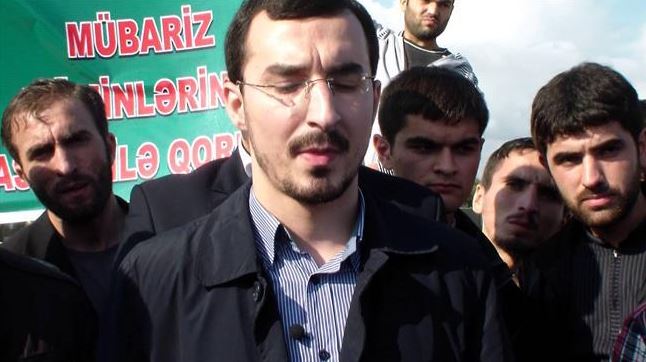
RNA - They face alleged charges including murder, terrorism, inciting religious hatred, organizing mass unrest, and illegal possession of weapons. All of them without exception reject those charges as fabricated; several confirmed they have been subjected to torture in an attempt to induce them to incriminate themselves, fellow defendants, and respected opposition leaders.
The two most prominent defendants are Taleh Bagirzade (also known as Sheikh Bagirov), a young Shi'ite Muslim cleric who heads the Movement for Muslim Unity, and Fuad Qahramanli, deputy chairman of the opposition Azerbaijan Popular Front Party (AHCP).
Bagirzade was together with 13 other men during a raid by police on a house in the village of Nardaran on the outskirts of Baku. where they were attending prayers.
The attack came as peaceful Shia Muslims gathered for a religious ceremony in the village of Nardaran to mark Araba'een, the 40th day after the death of Imam Hussein (PBUH) and his followers in a battle of Karbala.
The reports said violence erupted when security forces savagely attempted to arrest Tale' Bagirzade, the leader of the MMU, who was delivering a speech on the occasion. At least four people were killed as police used live fire. Witnesses also said Wahhabi Takfiri elements killed two police officers at the scene.
Azerbaijan’s population is about 80% Shia Muslim, 15% Sunni Muslim and 3% Christian. The government is secular. Nardaran is an extremely poor village, and a stronghold for Shia Muslims.
This is while the government claims police forces were attacked with a grenade and automatic fire. It said the operation was launched to liquidate the “unregistered” group operating in Nardaran.
Azerbaijan regime claims that Bagirzade created the Movement for Muslim Unity with the aim of overthrowing the constitutional order and establishing "a religious state under Shari'a law." He and his associates are said to have recruited supporters in Baku and other parts of the country and provided them with various types of weaponry, and to have conducted "illegal meetings" in Nardaran to discuss mobilizing the population in a violent uprising against the authorities.
According to regime authorities, the November raid was undertaken to neutralize "an armed criminal group that acted under the cover of religion and was seeking to destabilize the social-political situation and organize mass unrest and acts of terrorism."
Oqtay Gyulaliyev of the public group Azerbaijan Without Political Prisoners says there is no evidence to support the allegations of terrorism. Why, he asks, if Bagirzade and his associates were indeed terrorists, were rank-and-file local police deployed to detain them, rather than a specialized counterterrorism force? Why were civilian lives endangered, and why did the police open fire immediately rather than call on the group of men to surrender?
Bagirzade's lawyer Elcin Sadiqov said after the preliminary court hearings last month that many points in the indictment remain unclear. He too said there was no evidence that it was the accused who fired on the police, or even that the two dead men identified as police officers were indeed such.
Bagirzade stresses that he has never advocated violence. He suggested that the police action to detain him was in retaliation for the criticism voiced by the Movement for Muslim Unity of blatant falsification during the parliamentary elections on November 1.
Qahramanli, who was nowhere near Nardaran at the time of the raid, was detained at his home two weeks after it took place for comments about it that he posted on Facebook. He was allegedly charged with anti-state propaganda and inciting racial or religious hatred and remanded in pretrial detention. Six months later, a further charge was brought against him of calling for civil disobedience and mass unrest.
Testifying on August 11, Qahramanli said he was being tried solely for having expressed a critical opinion of the Azerbaijani authorities. "The authorities want to frighten those people who come out against corruption [and] arbitrary [reprisals], which is why they fabricate political cases [against such critics]," he affirmed.
Gozyal Bayramli, who like Qahramanli is an AHCP deputy chairman, is on record as saying he is convinced that despite the total lack of any supporting evidence, the Azerbaijani authorities are determined to prove a connection between the party and the purported Shi'ite Muslim group in order to discredit the AHCP in the eyes of the international community.
Bagirzade says investigators tortured him to induce him to incriminate AHCP Chairman Ali Kerimli and Camil Hasanli, the head of the opposition National Council of Democratic Forces, but that he refused to do so.
Up to 50 other persons were apprehended in Nardaran on the day of the police raid. Some were subsequently released; others have been tried individually or in small groups on less serious charges such as alleged possession of weapons.
The arrest of Bagirov came months after he and a number of respected Shia clerics in Azerbaijan met Iranian senior cleric Ayatollah Nouri Hamedani in Azerbaijan. State media aired images at the time showing Bagirov welcoming the Ayatollah, a source of emulation for Shias around the world, accusing the leader of MMU of working for foreign states and seeking to overthrow the government of strongman President Ilham Aliyev.
Azerbaijn is a majority Shia state of more than nine million people, with Shias accounting for 85 percent of the population. The secular government of Aliyev suppressed a Shia-dominated popular uprising in 2010 amid international outcry over his heavy-handed crackdown.
R111/108/C/